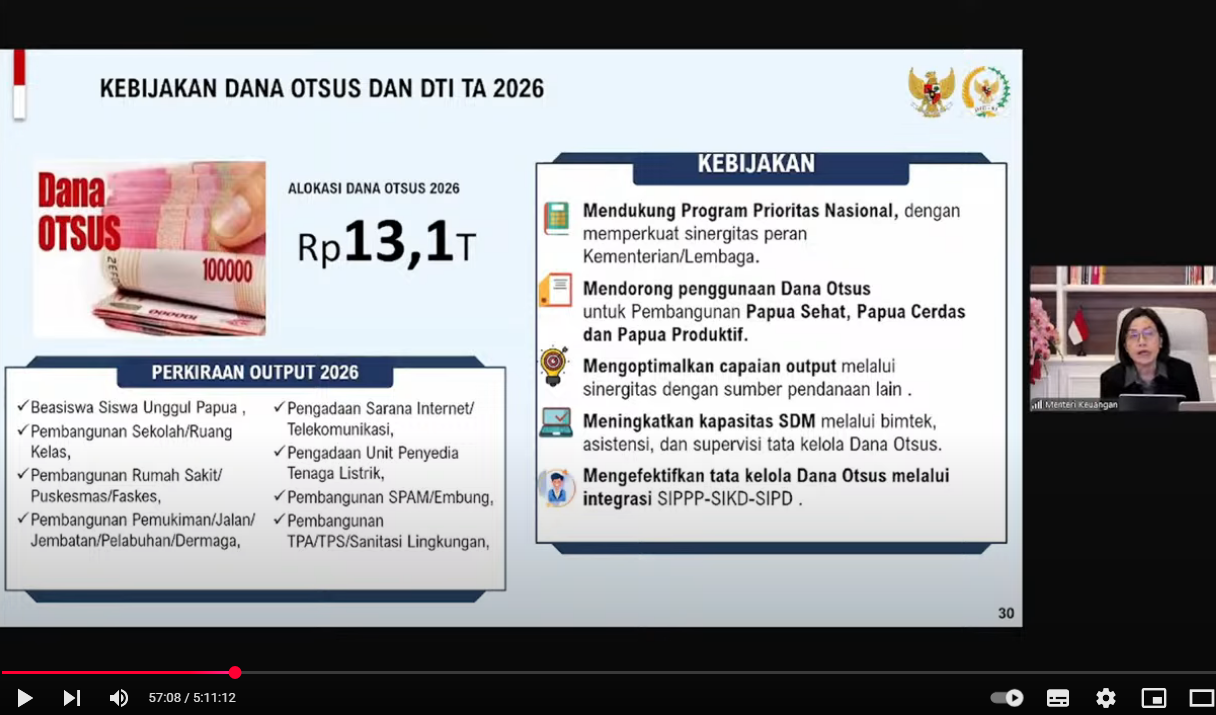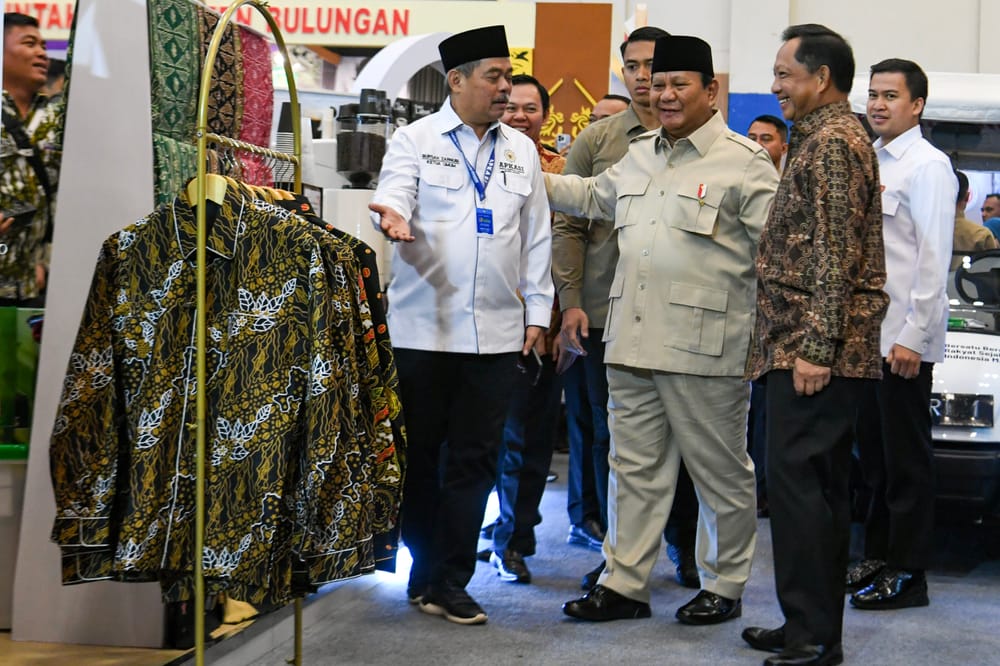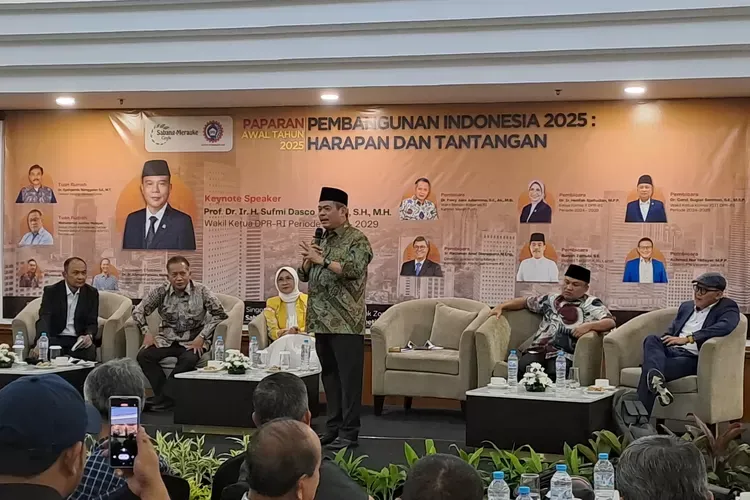The westernmost and easternmost regions of Indonesia can breathe a sigh of relief. Minister of Finance Sri Mulyani Indrawati stated that the Special Autonomy Funds or Otsus for the Provinces of Aceh and Papua are no longer included as targets for government budget efficiency in the 2026 State Revenue and Expenditure Budget Plan (RAPBN).
Previously, as a follow-up to Presidential Instruction Number 1 of 2025 concerning Expenditure Efficiency in the Implementation of the 2025 State Budget and Regional Budget, the Ministry of Finance reduced the 2025 Regional Budget. The budget efficiency was regulated through the Decree of the Minister of Finance Number 29 of 2025 concerning Adjustments to the Details of Allocation Transfers to Regions According to Provinces/Regencies/Cities for the 2025 Fiscal Year in the context of Expenditure Efficiency in the Implementation of the 2025 State Budget and Regional Budget.
Based on the Decree of the Minister of Finance, the budget transfer to the regions (TKD) in 2025 was cut by Rp 50.59 trillion. Meanwhile, the Papua Otsus fund was Rp 9.69 trillion remaining from the Rp 10.04 trillion ceiling. Meanwhile, the Aceh Otsus fund was cut from Rp 4.46 trillion to Rp 4.3 trillion.
Then, for the underpayment of revenue sharing funds, from a total ceiling of Rp 27.80 trillion, Rp 13.90 trillion was cut. Meanwhile, the DIY Special Privilege Fund was cut by Rp 200 billion from Rp 1.2 million. The Village Fund, from a ceiling of Rp 71 trillion, was cut by Rp 2 trillion.
Now, in contrast to the policy for this year, the allocation of Otsus Funds in the 2026 RAPBN is set at Rp 13.1 trillion for next year. Although this quota is down compared to the 2025 allocation of Rp 17.52 trillion, the decision is considered quite positive because it can accelerate regional development without any funding cuts. Thus, development is more maximal.
Economic observer from the Institute for Development of Economics and Finance (Indef), Eko Listiyanto, said that Otsus funds can be used to accelerate development because regions receiving special autonomy can catch up with other regions.
“The use of these funds is prioritized to improve the quality of life of the community through improved services in the education, health, and economic sectors,” he explained to SUAR, Wednesday, September 3, 2025.
Focus on basic education and health
Minister of Finance Sri Mulyani emphasized that Otsus funds are still prioritized for the education, health, and basic infrastructure sectors in special autonomy regions, especially Papua.
“Currently, there are no plans to make efficiencies for Otsus funds. The most important thing is that Otsus can be -delivered,” said Sri Mulyani in a working meeting of DPD Committee IV with the Minister of National Development Planning/Head of Bappenas and the Governor of Bank Indonesia on Tuesday, September 2, 2025.
She explained that the use of Papua Province's Otsus funds will be directed to three main programs, namely Healthy Papua, Smart Papua, and Productive Papua. For the education sector, funds are focused on the Superior Papuan Student Scholarship (Basiswap), the construction of new schools, and the repair of classrooms. In the health sector, allocations are used for the construction of hospitals, community health centers, and other medical service facilities.
In addition to education and health, Otsus funds are also intended for the construction of basic infrastructure. Priority projects include settlements, roads, bridges, ports, and docks.
Funding support is also allocated for the procurement of internet and telecommunications facilities, electricity units, drinking water supply systems (SPAM), reservoirs, and waste management and environmental sanitation facilities.
Regarding these Special Autonomy Funds, according to Sri Mulyani, President Prabowo Subianto also inquired about the results of the budget allocated to the regions. Understandably, the Special Autonomy Funds are always budgeted in the State Budget (APBN) every year, but there are no tangible results for the community – even though the funds are always provided.
Every year, Special Autonomy Funds are always budgeted in the State Budget (APBN), but there are no tangible results for the community – even though the funds are always provided.
"After more than 10 years, hasn't there been an evaluation? On one hand, the funds are available every year, but on the other hand, the community may not see tangible results," said Sri Mulyani.
Therefore, next year the government will increase the absorption of Special Autonomy Funds so that they can be utilized more effectively by the recipient regions.
Responding to regional aspirations
The Chairman of Committee III of the DPD RI (Regional Representative Council), Filep Wamafma, welcomed the government's decision to ensure that the Special Autonomy Funds are not included in the 2026 budget efficiency list.
According to Filep, this step is the right response to the aspirations of the Papuan people who have been relying on Special Autonomy Funds for regional development.
"As the leader of Committee III of the DPD RI and also as a representative of the West Papua region, I appreciate the government's decision to ensure that Special Autonomy Funds are not affected by efficiency measures next year. This answers the aspirations that we conveyed in the DPD RI Plenary Meeting last March," said Filep.
Filep emphasized that the government needs to be careful in making policies related to Special Autonomy Funds. He mentioned that most provinces in Papua still heavily rely on these funds as a source of strengthening their regional budgets (APBD).






